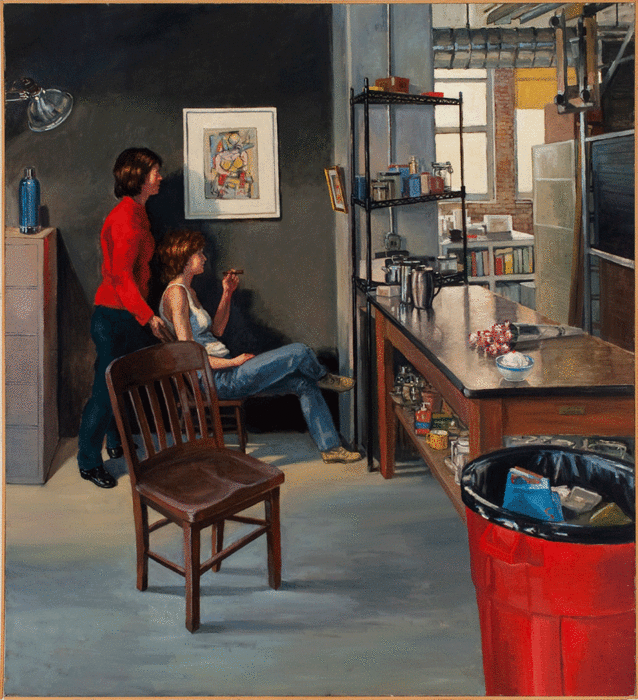
Eat Paint Studio is pleased to announce a minor retrospective exhibition featuring the work of Chicago artist Marion Kryczka this June. Spanning his 40+ year creative career the exhibit will include selected recent paintings and works on paper. An opening reception will be held for Marion Kryczka at Eat Paint Studio, 5036 N. Lincoln Ave, on Friday, June 7, from 6-9PM. The exhibit will be on view through July 20, 2019. This event is free and open to the public.
For many years, Marion’s studio was directly opposite the Aragon Ballroom, in Uptown. An ethnically diverse neighborhood rife with gang violence and peppered with tiny bars and liquor stores, Uptown was (and arguably still is) a living petri dish of humanity. A figurative painter for the duration of it’s not being cool, Marion painted lush and provocative nudes against the green linoleum backdrop of his small studio. The Cleaning Woman at Rest #2, shows an ample bosomed young woman grinning to herself, framed by a bottle of vodka and a particularly vehement red mop handle. A red rose sits in a box behind her, petals just shy of falling to the ground in shame or resignation. Some of these nudes are literal pornography. Transcribed in paint they retain their essential vulgarity but become beautiful in the sense that they become more true. These are paintings of male desire and an appreciation for the female form, and since male desire is the gooey problematic center of Western religious and philosophical struggles, the female figure is the perfect vehicle for themes of life, death, faith, and sex.
By the mid-90’s, Uptown began to succumb to gentrification and the mixed-use building at 1107 W Lawrence was renovated and sold off as vintage loft condo units. Marion moved his studio practice to the Ravenswood neighborhood where he shared a space in one of the old factory buildings that lines the former Industrial Corridor.
In his momento mori (meaning, “remember you will die”) paintings, Marion groups objects such as knives, necklaces, dead birds and skulls in arrangements that suggest Renaissance "vanitas" paintings, using allegory to point to the futility of earthly ambitions and accomplishments. He observes that, "Objects, once arranged, are no longer that same. They take on a new significance."
“The artist consciously manipulates a seeming realism in the service of transcendent perception. – Perhaps one of the reasons that these techniques contribute so much to the quiet power of expression in the works is that they arise so naturally and unobtrusively. The artist throughout his life experience has assimilated the past of art and human histories and, with an impressive talent and lively technique, allows instinct to mould his expression. Kryczka, at the opening of the exhibition, preferred to pass over a point by point explanation of specific paintings, and, when questioned by one of the gallery-goers, gave one of the most intelligent responses any creative artist can give: ‘I see a painting -- who cares what it means -- I like it.’”
- G. Jurek Polanski, review of 1999 exhibition at the Fine Arts Building Gallery, Chicago.
Marion’s later still lifes gravitate to more domestic scenes. These paintings are quiet, self reflective, internal. A kitchen counter displays the familiar sprawl of dinner preparations; raw meat or fish, a transistor radio, half a stick of butter. The majestic trout is esteemed equally for his beauty and strength when alive as he is for his contribution to the dinner table. Always one to appreciate a dirty joke, Marion does manage to make suggestive use of a sausage, but in all these paintings depict simple pleasures, simply painted. In Light Sconce, a darkened hallway points the viewer toward a second floor, stairs we can’t ascend but strain to see above. Our sightline is kept low by a peaked ceiling gilded with reflected light, a church in praise of the domestic.
Kryczka's recent drawings are rooted in his foundation as a figurative artist. Smudges of charcoal and pastel smoke cloud the page, ghostly bullets ricochet through a narrow alley, and soldiers make their way slowly through tall grass and forests. Young men grin for a group photograph or stand in taut silence, anticipating action and death. Mostly, there is waiting and not knowing. We sense that these drawings encompass both past and present as they take shape on paper. Drawing is a means of meditation, exploring what has been and what shall be for both the subject and the artist himself.
"You could say I have an obsession with the temporal nature of life and the inevitability of mortality," Kryczka said in a 1999 interview with arts writer G. Jurek Polanski. The passage of time, and the inevitable presence of death in life, are a major theme throughout Marion’s work as a painter. But, this interest is rarely morbid. Marion’s personal vitality and exuberant embrace of color and light, glory in the sensory experience of life.
After graduating from the School of the Art Institute, Kryczka earned a master's degree from the University of Illinois at Champaign-Urbana. He returned to SAIC as an associate professor of painting and drawing in 1981 where he taught until his early retirement due to Parkinson’s disease. He continues to create work, primarily large scale drawings, in his home studio. Marion’s work has been exhibited in solo and group exhibitions throughout Chicago, New York and in Poland. His latest retrospective exhibit will be on display at Eat Paint Studio through July 20, 2019.
Image: The Emperor of Ice Cream, 50″ x 48″, oil on canvas



